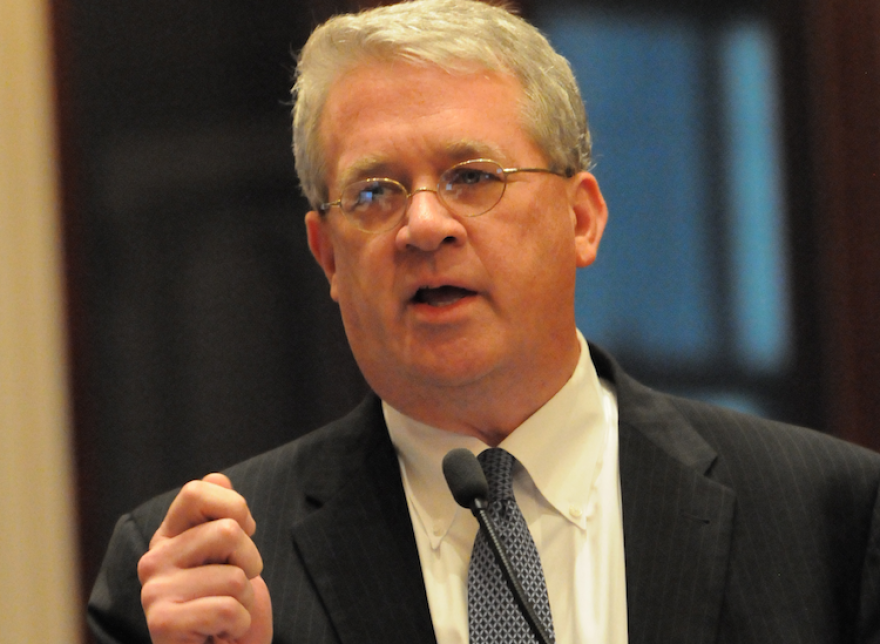While the historic 22-month Illinois budget impasse has dominated the legislative session in Springfield again, state lawmakers also have grappled with how to respond to Chicago’s gun violence.
One high-profile bill aimed at stemming the violence would impose longer prison sentences for repeat gun offenders. Under the proposal, people caught with an illegal gun a second time would face a maximum 14-year sentence. Judges could issue shorter punishments if they explain their reasons. Currently, the maximum sentence is seven years.
The bill already passed the Senate and needs approval in the House and from Gov. Bruce Rauner, who said he’ll sign it in its current form. The idea is nothing new in Springfield, but this time the opposition is coming from Chicago Democrats, not downstate Republicans or the National Rifle Association.
Here’s how politics are playing into the debate:
Rahm and the Republican leader
The call to pass a tougher sentencing bill has been loudest from Chicago Mayor Rahm Emanuel, who has found an unlikely political ally to sponsor the measure in the House: Republican Leader Jim Durkin of southwest suburban Western Springs.
Durkin has sided with Rauner — one of Emanuel’s main political rivals — on issues such as the state budget, the sale of the Thompson Center, and whether to let Chicago Public Schools declare bankruptcy. But Durkin said the city’s gun violence transcends politics, and he hopes to get the bill signed into law before violence typically rises in the summer.
“I think it’s just, enough is enough,” Durkin said. “We don’t want to see another summer come along where we’re going to have the horrific events we see every year.”
The opposition
But many African-American members of the House — including those who represent some of the most violent Chicago neighborhoods that this bill is supposed to help — oppose the legislation.
“I would say it’s incomplete,” said Democratic State Rep. Christian Mitchell, who represents Chicago’s Woodlawn, Grand Crossing and Hyde Park neighborhoods. “I think that you can do more to crack down on the bad apples who are terrorizing our community, but you also have to make sure that they’re not replaced.”

Mitchell stressed that he’s not opposed to the idea of the bill, but asked, if this bill is supposed to be Springfield’s political answer to Chicago’s gun violence, what happens if it doesn’t work?
“What I would argue is that getting something done that isn’t helpful and could be more harmful puts us all in a politically worse position -- and, by the way, a bad moral position -- and one that is going to lead to more carnage on our streets,” Mitchell said.
Mitchell and several other members of the House Black Caucus repeatedly pointed out that a better place to start would be to pass a state budget that funds economic, youth and mental health programs. Those programs have lost out to the continuing political fight at the statehouse for nearly two years.
Democratic State Rep. Andre Thapedi -- who represents Chicago’s Ashburn, Englewood, Park Manor and West Englewood neighborhoods -- said it’s problematic that Durkin doesn’t want to negotiate any more with the lawmakers who actually represent the parts of the state that this bill is meant to help.
“I would doubt that the plight of DuPage County residents is analogous to the plight of residents in Englewood,” Thapedi said.
Politics and the path ahead
Durkin said his experience as a Cook County prosecutor makes him confident that tougher sentencing will help Chicago’s gun violence. And he stressed that it’s Chicago’s own mayor and police superintendent who are pushing for it.
“They are the ones who are making the case and begging us and begging us to pass this legislation,” Durkin said, "because, of course, Chicago is where the worst firearms violence in the United States is happening right now."
If the Black Caucus doesn’t support the bill, the legislation is likely to need votes from somewhere else to pass. Previous attempts to approve stricter sentences for repeat gun offenders have failed, because downstate representatives from both parties weren’t on board due to opposition from the NRA.
This year, though, the NRA is not taking a position on the bill, which might explain why Durkin seems confident about his own Republican members voting yes.
Durkin said he currently sees “no challenges” from state Republicans.


